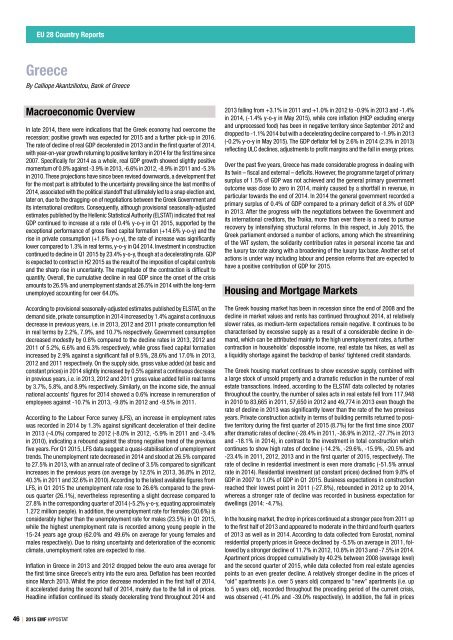Hypostat 2015
On 30 September 2015, the EMF-ECBC published Hypostat 2015 , which is its main statistical report, encompassing data on recent developments in housing and mortgage markets in the EU28 and beyond. Hypostat is the result of a collaborative effort by the European Mortgage Federation’s national delegations and external experts. The publication covers 33 countries – i.e. the EU28 plus Iceland, Norway, Russia, Turkey and the United States.
On 30 September 2015, the EMF-ECBC published Hypostat 2015 , which is its main statistical report, encompassing data on recent developments in housing and mortgage markets in the EU28 and beyond. Hypostat is the result of a collaborative effort by the European Mortgage Federation’s national delegations and external experts.
The publication covers 33 countries – i.e. the EU28 plus Iceland, Norway, Russia, Turkey and the United States.
You also want an ePaper? Increase the reach of your titles
YUMPU automatically turns print PDFs into web optimized ePapers that Google loves.
EU 28 Country Reports<br />
Greece<br />
By Calliope Akantziliotou, Bank of Greece<br />
Macroeconomic Overview<br />
In late 2014, there were indications that the Greek economy had overcome the<br />
recession; positive growth was expected for <strong>2015</strong> and a further pick-up in 2016.<br />
The rate of decline of real GDP decelerated in 2013 and in the first quarter of 2014,<br />
with year-on-year growth returning to positive territory in 2014 for the first time since<br />
2007. Specifically for 2014 as a whole, real GDP growth showed slightly positive<br />
momentum of 0.8% against -3.9% in 2013, -6.6% in 2012, -8.9% in 2011 and -5.3%<br />
in 2010. These projections have since been revised downwards, a development that<br />
for the most part is attributed to the uncertainty prevailing since the last months of<br />
2014, associated with the political standoff that ultimately led to a snap election and,<br />
later on, due to the dragging-on of negotiations between the Greek Government and<br />
its international creditors. Consequently, although provisional seasonally-adjusted<br />
estimates published by the Hellenic Statistical Authority (ELSTAT) indicated that real<br />
GDP continued to increase at a rate of 0.4% y-o-y in Q1 <strong>2015</strong>, supported by the<br />
exceptional performance of gross fixed capital formation (+14.6% y-o-y) and the<br />
rise in private consumption (+1.6% y-o-y), the rate of increase was significantly<br />
lower compared to 1.3% in real terms, y-o-y in Q4 2014. Investment in construction<br />
continued to decline in Q1 <strong>2015</strong> by 23.4% y-o-y, though at a decelerating rate. GDP<br />
is expected to contract in H2 <strong>2015</strong> as the result of the imposition of capital controls<br />
and the sharp rise in uncertainty. The magnitude of the contraction is difficult to<br />
quantify. Overall, the cumulative decline in real GDP since the onset of the crisis<br />
amounts to 26.5% and unemployment stands at 26.5% in 2014 with the long-term<br />
unemployed accounting for over 64.0%.<br />
According to provisional seasonally-adjusted estimates published by ELSTAT, on the<br />
demand side, private consumption in 2014 increased by 1.4% against a continuous<br />
decrease in previous years, i.e. in 2013, 2012 and 2011 private consumption fell<br />
in real terms by 2.2%, 7.9%, and 10.7% respectively. Government consumption<br />
decreased modestly by 0.8% compared to the decline rates in 2013, 2012 and<br />
2011 of 5.2%, 6.6% and 6.3% respectively, while gross fixed capital formation<br />
increased by 2.9% against a significant fall of 9.5%, 28.6% and 17.0% in 2013,<br />
2012 and 2011 respectively. On the supply side, gross value added (at basic and<br />
constant prices) in 2014 slightly increased by 0.5% against a continuous decrease<br />
in previous years, i.e. in 2013, 2012 and 2011 gross value added fell in real terms<br />
by 3.7%, 5.8%, and 8.9% respectively. Similarly, on the income side, the annual<br />
national accounts’ figures for 2014 showed a 0.6% increase in remuneration of<br />
employees against -10.7% in 2013, -9.8% in 2012 and -9.5% in 2011.<br />
According to the Labour Force survey (LFS), an increase in employment rates<br />
was recorded in 2014 by 1.3% against significant deceleration of their decline<br />
in 2013 (-4.0%) compared to 2012 (-8.0% in 2012, -5.9% in 2011 and -3.4%<br />
in 2010), indicating a rebound against the strong negative trend of the previous<br />
five years. For Q1 <strong>2015</strong>, LFS data suggest a quasi-stabilisation of unemployment<br />
trends. The unemployment rate decreased in 2014 and stood at 26.5% compared<br />
to 27.5% in 2013, with an annual rate of decline of 3.5% compared to significant<br />
increases in the previous years (on average by 12.5% in 2013, 36.8% in 2012,<br />
40.3% in 2011 and 32.6% in 2010). According to the latest available figures from<br />
LFS, in Q1 <strong>2015</strong> the unemployment rate rose to 26.6% compared to the previous<br />
quarter (26.1%), nevertheless representing a slight decrease compared to<br />
27.8% in the corresponding quarter of 2014 (-5.2% y-o-y, equating approximately<br />
1.272 million people). In addition, the unemployment rate for females (30.6%) is<br />
considerably higher than the unemployment rate for males (23.5%) in Q1 <strong>2015</strong>,<br />
while the highest unemployment rate is recorded among young people in the<br />
15-24 years age group (62.0% and 49.6% on average for young females and<br />
males respectively). Due to rising uncertainty and deterioration of the economic<br />
climate, unemployment rates are expected to rise.<br />
Inflation in Greece in 2013 and 2012 dropped below the euro area average for<br />
the first time since Greece’s entry into the euro area. Deflation has been recorded<br />
since March 2013. Whilst the price decrease moderated in the first half of 2014,<br />
it accelerated during the second half of 2014, mainly due to the fall in oil prices.<br />
Headline inflation continued its steady decelerating trend throughout 2014 and<br />
2013 falling from +3.1% in 2011 and +1.0% in 2012 to -0.9% in 2013 and -1.4%<br />
in 2014, (-1.4% y-o-y in May <strong>2015</strong>), while core inflation (HICP excluding energy<br />
and unprocessed food) has been in negative territory since September 2012 and<br />
dropped to -1.1% 2014 but with a decelerating decline compared to -1.9% in 2013<br />
(-0.2% y-o-y in May <strong>2015</strong>). The GDP deflator fell by 2.6% in 2014 (2.3% in 2013)<br />
reflecting ULC declines, adjustments to profit margins and the fall in energy prices.<br />
Over the past five years, Greece has made considerable progress in dealing with<br />
its twin – fiscal and external – deficits. However, the programme target of primary<br />
surplus of 1.5% of GDP was not achieved and the general primary government<br />
outcome was close to zero in 2014, mainly caused by a shortfall in revenue, in<br />
particular towards the end of 2014. In 2014 the general government recorded a<br />
primary surplus of 0.4% of GDP compared to a primary deficit of 8.3% of GDP<br />
in 2013. After the progress with the negotiations between the Government and<br />
its international creditors, the Troika, more than ever there is a need to pursue<br />
recovery by intensifying structural reforms. In this respect, in July <strong>2015</strong>, the<br />
Greek parliament endorsed a number of actions, among which the streamlining<br />
of the VAT system, the solidarity contribution rates in personal income tax and<br />
the luxury tax rate along with a broadening of the luxury tax base. Another set of<br />
actions is under way including labour and pension reforms that are expected to<br />
have a positive contribution of GDP for <strong>2015</strong>.<br />
Housing and Mortgage Markets<br />
The Greek housing market has been in recession since the end of 2008 and the<br />
decline in market values and rents has continued throughout 2014, at relatively<br />
slower rates, as medium-term expectations remain negative. It continues to be<br />
characterised by excessive supply as a result of a considerable decline in demand,<br />
which can be attributed mainly to the high unemployment rates, a further<br />
contraction in households’ disposable income, real estate tax hikes, as well as<br />
a liquidity shortage against the backdrop of banks’ tightened credit standards.<br />
The Greek housing market continues to show excessive supply, combined with<br />
a large stock of unsold property and a dramatic reduction in the number of real<br />
estate transactions. Indeed, according to the ELSTAT data collected by notaries<br />
throughout the country, the number of sales acts in real estate fell from 117,948<br />
in 2010 to 83,665 in 2011, 57,650 in 2012 and 49,774 in 2013 even though the<br />
rate of decline in 2013 was significantly lower than the rate of the two previous<br />
years. Private construction activity in terms of building permits returned to positive<br />
territory during the first quarter of <strong>2015</strong> (8.7%) for the first time since 2007<br />
after dramatic rates of decline (-28.4% in 2011, -36.9% in 2012, -27.7% in 2013<br />
and -18.1% in 2014), in contrast to the investment in total construction which<br />
continues to show high rates of decline (-14.2%, -29.6%, -15.9%, -20.5% and<br />
-23.4% in 2011, 2012, 2013 and in the first quarter of <strong>2015</strong>, respectively). The<br />
rate of decline in residential investment is even more dramatic (-51.5% annual<br />
rate in 2014). Residential investment (at constant prices) declined from 9.8% of<br />
GDP in 2007 to 1.0% of GDP in Q1 <strong>2015</strong>. Business expectations in construction<br />
reached their lowest point in 2011 (-27.8%), rebounded in 2012 up to 2014,<br />
whereas a stronger rate of decline was recorded in business expectation for<br />
dwellings (2014: -4.7%).<br />
In the housing market, the drop in prices continued at a stronger pace from 2011 up<br />
to the first half of 2013 and appeared to moderate in the third and fourth quarters<br />
of 2013 as well as in 2014. According to data collected from Eurostat, nominal<br />
residential property prices in Greece declined by -5.5% on average in 2011, followed<br />
by a stronger decline of 11.7% in 2012, 10.8% in 2013 and -7.5% in 2014.<br />
Apartment prices dropped cumulatively by 40.2% between 2008 (average level)<br />
and the second quarter of <strong>2015</strong>, while data collected from real estate agencies<br />
points to an even greater decline. A relatively stronger decline in the prices of<br />
“old” apartments (i.e. over 5 years old) compared to “new” apartments (i.e. up<br />
to 5 years old), recorded throughout the preceding period of the current crisis,<br />
was observed (-41.0% and -39.0% respectively). In addition, the fall in prices<br />
46 | <strong>2015</strong> EMF HYPOSTAT



